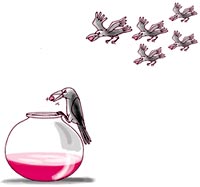A partial success

subsidies have clearly worked to the detriment of equitable water supplies in the country. And now, studies across the country have shown that people are willing to pay for safe drinking water. This is true of many rural areas as well. But are local governments competent enough to provide this service efficiently?
The panchayats are hamstrung by paucity of finances and unskilled manpower. An effective alternative has been created, in many parts of the country, by collaborations between local communities and the private sector. In such programmes, the community participates in constructing as well as in operating and maintaining installations. Local village water and sanitation committees (vwsc) carry out these functions. The community shares some of the capital costs by mobilising contribution from individual households. The vwsc charges users to operate and maintain water supply installations. All this creates a sense of ownership among users and also ensures the system is cost-effective. The private operator is merely a facilitator.
However, in many cases the vwscs fall by the wayside after a project is implemented and ultimately the task of operation and maintenance falls on village panchayats. Villagers very often lack the technical skills needed for this. The government gives them no help. This is where non-governmental organisations must step in and provide guidance to villagers. Only then can the collaboration between communities and the private sector succeed.
Veerashekharappa is with the Institute for Social and Economic Change, Bangalore
Related Content
- Recurrent climatic shocks and humanitarian aid: impacts on livelihood outcomes in Malawi
- Peace over war: conflict, contest and cooperation in water sharing
- Deepening decentralization in Zambia: political economy constraints and opportunities for reform
- South Asia Economic Focus, Fall 2019: making (de)centralization work
- MP Kalikesh Narayan Singh Deo interview: championing the cause of climate change and low carbon development in Dist. Bolangir, Odisha
- MP Kalikesh Narayan Singh Deo interview: championing the cause of climate change and low carbon development in Dist. Bolangir, Odisha
